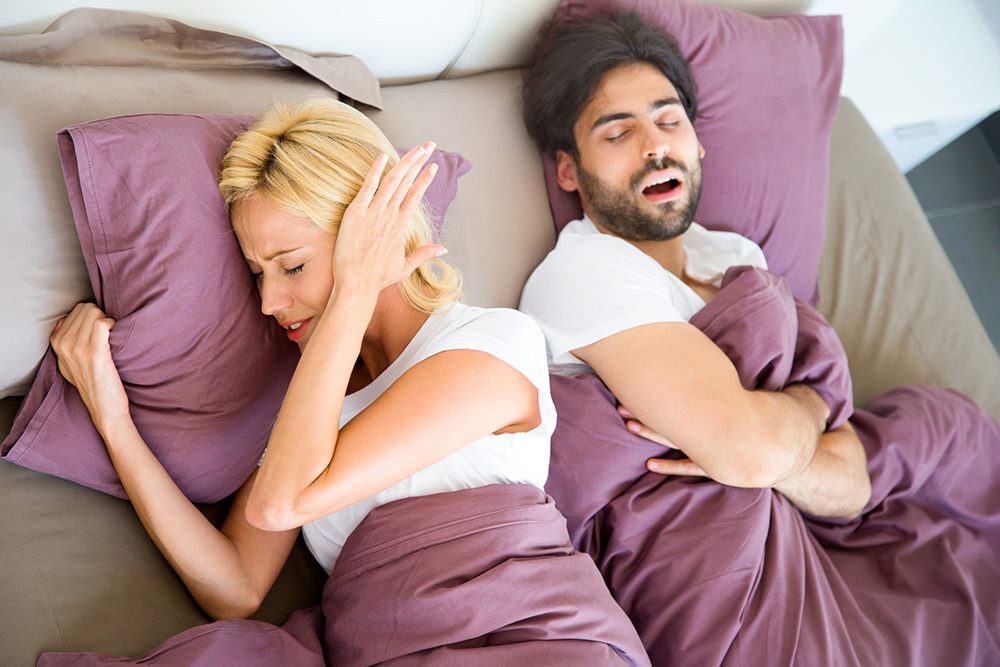5 Signs You Might Have Sleep Apnea

Sleep apnea is a common sleep disorder in which your breathing is disrupted throughout the night—and it can have a negative effect on your comfort and health. The most common form of sleep apnea is obstructive sleep apnea, which causes a physical airway blockage during sleep.
What makes sleep apnea so dangerous is that it limits the amount of air reaching your lungs and in turn deprives your body of the oxygen it needs. In severe cases of sleep apnea, this disruption in breathing can occur hundreds of times per night. A family history of sleep apnea, naturally small airways, or being overweight can make you more susceptible to sleep apnea.
But how do you know you have sleep apnea if it happens while you’re sleeping? Here are a few signs to look out for:
1. You snore…a lot
This one may not be a surprising sign for anyone familiar with sleep apnea, but when does snoring go from a normal occurrence to something you should be concerned about? Snoring occurs when there is an obstruction in the respiratory tract—the harsh sound is the result of air flowing past the tissues in your throat, causing them to vibrate as you sleep.
One person’s propensity to snore may be the result of the natural anatomy of their mouth and throat, how many cocktails they had with dinner, the position they’re sleeping in, or if they have any nasal congestion. Snoring is by no means a one-way ticket to a sleep apnea diagnosis. However, if your snoring is consistently excessive, disruptive, and accompanied by other symptoms, it is worth getting checked out—your bed partner will thank you for it.
2. You’re always tired
Do you ever wake up feeling exhausted even though you got plenty of sleep? If this routinely happens, it may indicate that you were woken up multiple times throughout the night when your breathing paused. You may have no memory of waking up, but any repeated disruption in sleep can leave you fatigued.
With this lack of sleep comes a few of the other upsetting symptoms of sleep apnea: depression, grumpiness, and a decrease in libido. If you’re concerned with a sudden tank in mood or experience tiredness throughout the day, make sure you discuss it with your MD.
3. You are startled awake at night
Have you ever been peacefully drifting off to sleep only to have your body jerk awake, as if you’re falling? Fun fact: this is called a “hypnic jerk,” and it occurs in nearly 70% of the population. While this common occurrence is nothing to worry about, if you notice yourself jerking awake frequently throughout the night, every night, it could be a sign of sleep apnea.
Whether you wake up gasping, drenched in sweat, or have the frequent urge to pee, these potential sleep apnea symptoms can make for a rough night—and it can be scary to wake up out of breath and with your heart thumping.
4. You frequently get headaches
Too many beers at a Superbowl party, stress, or illness can all leave you with a morning headache—but if you notice your head is throbbing morning after morning, you should bring it up at your next physical.
For those with sleep apnea, this morning headache is caused by excess carbon dioxide in the bloodstream and a widening of your blood vessels resulting from lack of oxygen throughout the night. These headaches typically occur all over the head rather than in a localized spot.
5. Your mouth is dry in the morning
Dry mouth can result from certain medications, having a stuffy nose, or the cooler, drier air of winter. But if you’re plagued by dry mouth every day for seemingly no reason, you may be sleeping with your mouth open all night because you’re having trouble getting enough air. If you are also experiencing any of the other symptoms on the list, make sure to make note of it for your next doctor’s appointment.
Bottom line: See your doc if you have any concerns
Alone, these signs aren’t necessarily an indicator that something serious is going on. The isolated snore fest or occasional dry mouth doesn’t necessarily mean you have sleep apnea. But if you’ve noticed any changes in how you feel, are worried over new symptoms, or your significant other has mentioned unusual nighttime occurrences, the best thing you can do is discuss your concerns with your doctor. A sleep study may be all that’s needed to rule out or diagnose sleep apnea so you can get started on getting better.
Once diagnosed, the symptoms of sleep apnea can sometimes be improved by weight loss, avoiding alcohol and cigarettes, and adjusting the way you sleep—but you may also require treatment to get immediate relief and prevent further health issues. CPAP machines have traditionally been the primary treatment protocol for sleep apnea, but many patients find the noise and discomfort of these machines difficult to bear.
Here at North Atlanta Aesthetic Dentistry, Dr. Gurley offers an alternative option for treating sleep apnea in Atlanta: a custom-fit oral device that keeps your airways open so you have a peaceful night’s sleep. If you’d like to learn more or find out if an oral device is a good fit for you, contact us to schedule your consultation.